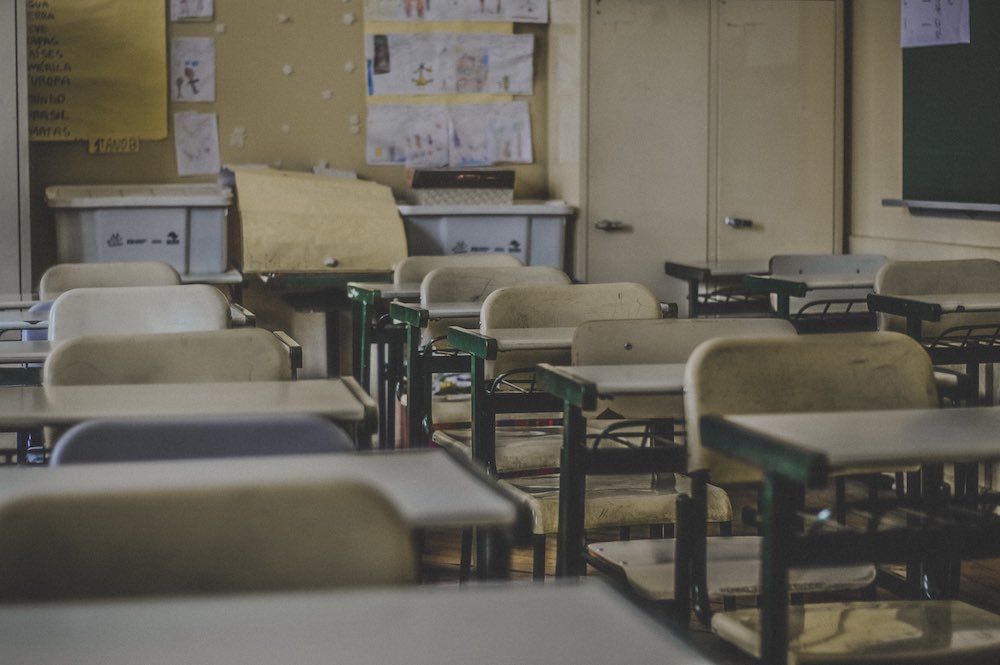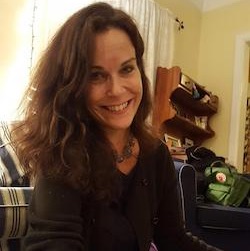 I sit at my desk at home in my New Jersey suburb, writing poems about gun violence, and I hear police sirens. My first thought is that there is a shooter at my daughters’ high school three blocks away.
I sit at my desk at home in my New Jersey suburb, writing poems about gun violence, and I hear police sirens. My first thought is that there is a shooter at my daughters’ high school three blocks away.
Since the Newtown massacre, police presence, sirens, and lockdowns are a feature of my daughters’ lives. Kids accept this new reality. My girls tell me that they are used to being told to “shelter in place”—which means there is no active danger—and they often can decode when a “lockdown drill” is happening (demanded by the state to occur once a month) as opposed to a true threat.
And so before I say more, I will freely admit that I have always been a parent who catastrophizes. Ever since my daughters were born—in fact ever since I was pregnant the first time—I have imagined calamities. And even after the first few years of my girl’s lives, which were full of frightening health crises as well as the usual garden variety terrifying moments involved in raising babies and toddlers, I nevertheless still panic when my teenage daughters don’t immediately text back, and I frequently imagine the worst, even if I know they are at home.
All of this informs my writing. And it informs my life. From the outset, I have thought—and written about—the fact that disaster and violence deeply inform my parenting and my daughters’ lives. My older daughter was a baby in New York City during 9/11. My daughters were young when Hurricane Katrina devastated the Gulf Coast and my hometown, New Orleans, where my father still lives.
But here in the present moment in 2019 I sit at my desk writing and listening to the cop cars and ambulances screeching down the quiet streets of my town, and I feel fear rise in my chest in a terribly different way. I know that my girls could be murdered at school, a place where they are supposed to be safe. This fear is unfortunately realistic. Unbelievably, the rate of kids killed by guns is on the rise in this country. The ratio of American kids killed by guns vs. those killed by cancer is 2:1.
I don’t know what to do with this information. So I sit at my desk and write poems about the world my children are living in, the world in which I am a parent. The world that since the presidential election of 2016 seems more dangerous than ever. And yet more urgent for us all to write about.
After the 2016 presidential election, after all the protests we attended, the letters we wrote, the news we watched, I was still livid, yelling about the state of the world each morning as I made breakfast and listened to NPR until, finally, my daughters asked me to stop yelling and being so upset at home. They told me it made them feel worse. They couldn’t vote. They couldn’t do more than they were doing, and my rage and distress made nothing better. I understood.
But what to do about guns in schools?
I’ve donated money, taken my girls to protests, gone to parent meetings in our town, and stood on the side of the street during the nation-wide school walk out in March, 2018, as my girls and their classmates demanded this country take action after the Parkland shooting.
But change has not happened.
How can this be?
Ultimately, I gave in to what I had always steadfastly refused: I took part in “active shooter response training” at my university. Alongside a scattered audience of faculty, staff, and students—who were told they could enter a raffle to be there—I spent two hours in an auditorium listening to an NYPD officer and another man from Homeland Security who made me feel much more terrified. The takeaway: if an active shooter entered my college classroom there was nothing I could do.
Not knowing how to move forward, with my daughters or my students, not knowing how to keep anyone safe, I sit at my desk and write poems and essays. I write about how to raise my daughters in this radically unsafe world. I write about how to teach my classes when a student tells me casually, as she gathers her books and bags at the end of an office hour appointment, after we’ve talked about her poem addressing gun violence: “The teachers at my high school told us to run zig zag around the playground if someone started shooting because we’d be harder to hit.”
And what do I think about the recent threat from an eighth grader at my girls’ school who wanted to “shoot up” the campus during the last week of classes? What about the threat—albeit unsubstantiated from the school administration—that a graduating senior was planning to kill people that week, too?
And what about the time I was on a bus heading to Massachusetts and my younger daughter texted me to say she was in a lockdown: We’re all in the classroom and the English teacher has pushed desks up against the door and stacked books on top.
After receiving this message I couldn’t reach my daughters, but I could get on the school Facebook page where school administrators told us: We have not yet released and cleared each classroom.
It’s a strange and awful world, I keep thinking, where we drop our children at school, fear for their lives, and get Facebook bulletins as updates on their safety. It’s a strange and awful world where I open my campus email when I get to work and read “Seven things you must do to avoid a mass shooting.”
It’s a terrible world in which any of this happens.
So I type out notes about “collateral damage” for my poems. I work on an erasure of the most recent email missive from my daughters’ school about how to shelter in place. Will anything I write about any of this violence and potential violence do any good? Or make any change?
Again and again I return to the questions I always carry with me, in my life as a parent and my role as a teacher, about what writing can do. I think of the words of two very different poets who so often guide me: Czeslaw Milosz, asking, “What is poetry which does not save nations or peoples?” and Muriel Rukeyser declaring, “What three things can never be done? Forget. Keep Silent. Stand alone.”
I know that my poems won’t save my children or any children in this country from violence. But I keep writing, in part because I am compelled to write, and it is how I express myself and understand the world, and in part because I have to be hopeful about writing and language can do to effect change in the world. As a parent, as a teacher, as a writer, I believe all of our writing matters.
I sit at my desk. The sirens scream by.
 Nicole Cooley is the author of six books of poems, most recently Of Marriage (Alice James Books 2018) and Girl after Girl after Girl (Louisiana State University Press 2017). She is the director of the MFA program in creative writing and literary translation at Queens College-City University of New York.
Nicole Cooley is the author of six books of poems, most recently Of Marriage (Alice James Books 2018) and Girl after Girl after Girl (Louisiana State University Press 2017). She is the director of the MFA program in creative writing and literary translation at Queens College-City University of New York.
Bourbon and Milk is an ongoing series that dives into the perplexing spaces parenting sometimes pushes us, and explores the unexpected ways writers may grow in them. If you’re interested in joining the conversation or contributing a Bourbon and Milk post, query Giuseppe Taurino at: giuseppe [at] americanshortfiction.org.